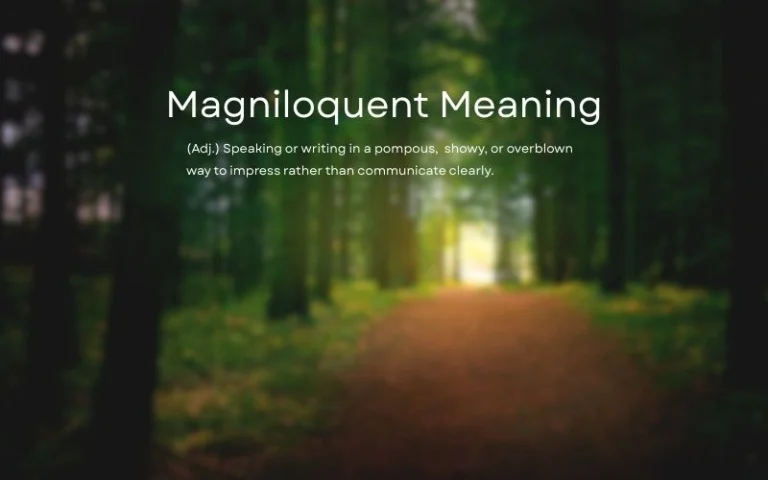Last Updated: Sept. 24, 2025
Magniloquent meaning refers to speaking or writing in a grand, pompous, or extravagantly eloquent manner, often using high-sounding words to impress rather than communicate clearly.
Disclaimer: This article provides general information about the meaning and usage of “magniloquent.” Language usage can vary by context, region, and cultural setting. Always consider your specific audience and situation when choosing your communication style.
Quick Reference: Magniloquent at a Glance
| Aspect | Details |
|---|---|
| Part of Speech | Adjective |
| Pronunciation | mag-NIL-uh-kwuhnt |
| Origin | Latin “magniloquus” (great speaking) |
| Tone | Often negative (pretentious) |
| Common Usage | Literature, criticism, formal writing |
| Difficulty Level | Advanced vocabulary |
What Does Magniloquent Really Mean?
Picture someone at a dinner party who uses phrases like “utilize” instead of “use” or “facilitate” instead of “help.” That’s magniloquence in action! The magniloquent meaning essentially describes speech or writing that’s deliberately grandiose and impressive-sounding, but often lacks substance or genuine emotion.
Think of it as the vocabulary equivalent of wearing a tuxedo to a backyard barbecue – technically impressive, but probably not the right fit for the situation.
The Psychology Behind Magniloquent Speech
People often resort to magniloquent meaning in their communication for several reasons:
- To appear more educated or sophisticated
- To compensate for lack of confidence
- To intimidate or impress others
- As a learned habit from academic or professional environments
However, truly effective communication usually favors clarity over complexity.
Magniloquent Meaning in Different Languages
Magniloquent Meaning in Hindi
In Hindi, magniloquent translates to “आडंबरपूर्ण भाषण” (aadambarpoorn bhashan) or “बड़बोला” (badbola), meaning pompous or boastful speech.
Magniloquent Meaning in Kannada
Kannada speakers would understand magniloquent as “ಆಡಂಬರದ ಮಾತು” (aadambarada maatu) or “ಗಂಭೀರ ಭಾಷಣೆ” (gambheera bhaashane).
Magniloquent Meaning in English
The magniloquent meaning in English is straightforward: using high-flown, pompous language that sounds impressive but may be unnecessarily complex.
Magniloquent Meaning in Marathi
In Marathi, it’s expressed as “आडमुठेपणाचे बोलणे” (aadmuthepanaache bolane) or “दांभिक भाषण” (daambhik bhashan).
magniloquent meaning in Tamil
Tamil speakers would say “பெருமை பேசுதல்” (perumai pesuthal) or “ஆडம்பரமான பேச்சு” (aadambaramaana pechchu).
Magniloquent Meaning in Bengali
Bengali translates this as “আড়ম্বরপূর্ণ কথা” (arambarpurno kotha) or “দাম্ভিক বক্তৃতা” (daambhik boktrita).
Magniloquent Meaning in Malayalam
In Malayalam, it’s “ആഡംബരമായ സംസാരം” (aadambaraamaaya samsaaram) or “വീണ്ടുമൊഴി” (veendumozhi).
Magniloquent Meaning in Telugu
Telugu speakers use “గొప్పగా మాట్లాడటం” (goppagaa maatlaadatam) or “ఆడంబరమైన మాట” (aadambaramaina maata).
Magniloquent Meaning in Urdu
In Urdu, it’s “فخریہ کلام” (fakhriya kalaam) or “پرشکوہ گفتگو” (purshakoh guftagu).
Magniloquent Meaning and Definition: Breaking It Down
The magniloquent meaning and definition comes from two Latin words:
- Magnus = great, large
- Loqui = to speak
So literally, it means “great speaking” or “grand talking.” But here’s the twist – it’s usually not a compliment!
Historical Context
The word entered English in the 17th century during a time when elaborate, ornate speech was fashionable among the educated classes. However, as communication styles evolved toward clarity and directness, magniloquent meaning took on more negative connotations.
Magniloquent Meaning Synonyms
Understanding magniloquent meaning synonyms helps grasp the full scope of this concept:
| Similar Words | Subtle Differences |
|---|---|
| Bombastic | More aggressively pompous |
| Grandiloquent | Even more elaborate |
| Pretentious | Focuses on showing off |
| Florid | Emphasizes flowery language |
| Rhetorical | Can be positive or neutral |
| Verbose | Simply uses too many words |
Magniloquent Meaning in Hindi With Example
Let’s explore magniloquent meaning in Hindi with example to make this clearer:
Hindi Example: “वह हमेशा आडंबरपूर्ण भाषा में बात करता है, सीधी बात कभी नहीं करता।” (Vah hamesha aadambarpoorn bhaasha mein baat karta hai, seedhi baat kabhi nahin karta.)
English Translation: “He always speaks in magniloquent language, never talks straight.”
Real-World Examples of Magniloquent Speech
In Literature
Classic literature often features magniloquent characters. Shakespeare’s Polonius in Hamlet is famously magniloquent, using elaborate phrases when simple ones would do.
Magniloquent: “Give thy thoughts no tongue, nor any unproportioned thought his act.” Simple Translation: “Think before you speak or act.”
In Modern Context
- Political speeches that use grand phrases but say little
- Academic writing that obscures meaning with complex terminology
- Business jargon that sounds impressive but communicates poorly
When Magniloquent Language Works (And When It Doesn’t)
Appropriate Uses
The magniloquent meaning isn’t always negative. Sometimes grand language serves a purpose:
- Ceremonial occasions (graduations, weddings, state dinners)
- Formal literature and poetry
- Religious or spiritual contexts
- Historical or classical writing
When to Avoid It
Magniloquent speech backfires when:
- Your audience prefers plain speaking
- You’re trying to build trust and connection
- The message is urgent or practical
- You’re teaching or explaining complex ideas
The Fine Line: Eloquence vs. Magniloquence
Here’s a crucial distinction many people miss:
| Eloquent Speech | Magniloquent Speech |
|---|---|
| Clear and powerful | Impressive but unclear |
| Serves the message | Serves the speaker’s ego |
| Connects with audience | Creates distance |
| Uses apt, precise words | Uses fancy, unnecessary words |
Cultural Perspectives on Magniloquent Communication
Different cultures view magniloquent meaning differently:
- Western cultures generally prefer direct communication
- Some Eastern cultures appreciate more elaborate, respectful language
- Academic circles sometimes reward complex terminology
- Business environments increasingly favor clarity over complexity
How to Recognize Magniloquent Speech
Watch for these red flags that indicate someone’s being magniloquent:
- Unnecessary complexity where simple words would work
- Longer sentences than needed
- Abstract concepts instead of concrete examples
- Formal vocabulary in casual settings
- Repetitive ideas dressed up in different fancy words
The Digital Age and Magniloquence
Social media and digital communication have created interesting paradoxes around magniloquent meaning:
- LinkedIn posts often feature magniloquent business speak
- Academic Twitter can become pretentiously complex
- Email communication sometimes overcompensates with formal language
- Text messaging has swung toward extreme brevity
Teaching Moments: Using Magniloquent Awareness
Understanding magniloquent meaning helps in several ways:
For Writers
- Recognize when you’re overcomplicating your message
- Choose words that serve your readers, not your ego
- Balance sophisticated vocabulary with clear communication
For Speakers
- Match your language level to your audience
- Focus on connection rather than impression
- Use elaborate language purposefully, not habitually
For Readers and Listeners
- Look beyond fancy words to understand the actual message
- Don’t be intimidated by unnecessarily complex language
- Ask for clarification when magniloquent speech obscures meaning
Common Mistakes People Make
When learning about magniloquent meaning, people often:
- Assume it’s always bad – Sometimes formal language is appropriate
- Confuse it with intelligence – Smart people can communicate simply
- Swing too far toward simplicity – Some concepts require precise terminology
- Miss the intent – Sometimes magniloquence reveals insecurity, not arrogance
Building Better Communication Skills
Understanding magniloquent meaning helps you become a more effective communicator:
The CLEAR Method
- Concise: Say what you need to say
- Lucid: Make your meaning obvious
- Engaging: Connect with your audience
- Appropriate: Match your style to the situation
- Respectful: Honor your listeners’ time and intelligence
- Respectful: Honor your listeners’ time and intelligence
Conclusion
The magniloquent meaning teaches us a valuable lesson about communication: impressive-sounding language isn’t always impressive communication. While there’s a time and place for formal, elaborate speech, the most powerful communicators know when to use simple, direct language that connects with their audience.
Remember, the goal of communication is understanding, not intimidation. Whether you’re writing an email, giving a presentation, or having a conversation, consider whether your words serve your message or just your ego. Sometimes the most eloquent thing you can do is speak simply and clearly.
The beauty of understanding magniloquent meaning lies not in avoiding all complex language, but in making conscious choices about when and how to use it effectively.
Frequently Asked Questions
Q1: Is being magniloquent always a bad thing?
A: Not always! While magniloquent meaning often carries negative connotations, elaborate language can be appropriate for formal occasions, literature, or when precision requires specific terminology. The key is matching your language to your purpose and audience.
Q2: How can I tell if I’m being too magniloquent in my writing?
A: Ask yourself: “Could I say this more simply without losing meaning?” If yes, you might be veering into magniloquent territory. Also, if readers regularly ask for clarification or seem confused by your writing, it might be unnecessarily complex.
Q3: What’s the difference between magniloquent and eloquent?
A: Eloquent speech is clear, powerful, and serves the message. Magniloquent meaning involves speech that’s impressive-sounding but often unclear or unnecessarily complex. Eloquence connects; magniloquence can create distance.
Q4: Can magniloquent speech be effective in business?
A: Generally, no. Modern business communication favors clarity, brevity, and directness. While some formal situations might call for more elaborate language, magniloquent speech usually hinders rather than helps business communication.
Q5: How do I respond to someone who speaks magniloquently?
A: Don’t be intimidated! Focus on understanding their actual message rather than being impressed by their vocabulary. It’s perfectly fine to ask for clarification if their meaning isn’t clear.
Thank you for reading! For more insights into language, communication, and vocabulary, check out our previous blog post on:

